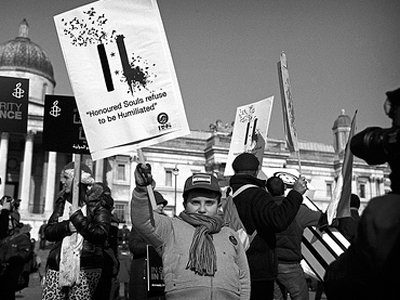A Responsibility to Protect?
If Obama decides to intervene in Syria, he will have a hard time selling it to a skeptical American public.
 Intervention in Syria is either a dangerous idea, an opportunity to further the cause of democracy promotion or nothing less than the moral duty of the international community. The Obama administration continues to act cagey about the prospects of a successful intervention and the potential for geopolitical fallout from Russia, China and Iran. But given European pressure and the recent Libyan precedent, it seems more than possible that the United States will come to embrace some sort of military intervention in Syria as the love child of regime-changing neoconservatives and genocide-preventing idealists. The real question then will be: Can Obama sell a Syrian intervention to the public? And if so, how?
Intervention in Syria is either a dangerous idea, an opportunity to further the cause of democracy promotion or nothing less than the moral duty of the international community. The Obama administration continues to act cagey about the prospects of a successful intervention and the potential for geopolitical fallout from Russia, China and Iran. But given European pressure and the recent Libyan precedent, it seems more than possible that the United States will come to embrace some sort of military intervention in Syria as the love child of regime-changing neoconservatives and genocide-preventing idealists. The real question then will be: Can Obama sell a Syrian intervention to the public? And if so, how?
The likeliest pitch for Obama to use is some form of the responsibility-to-protect (R2P) ethic. Articulated after the international community’s tepid response to the Bosnian meltdown, R2P has become the liberal interventionist’s best friend, offering a justification for violating national sovereignty and taking foreign governments to task for failing to protect their people from violence. Obama used this line with Libya, arguing that:
To brush aside America's responsibility as a leader and—more profoundly—our responsibilities to our fellow human beings under such circumstances would have been a betrayal of who we are. . . . Some nations may be able to turn a blind eye to atrocities in other countries. The United States of America is different. And as president, I refused to wait for the images of slaughter and mass graves before taking action.
And indeed, the loudest voices so far urging intervention in Syria belong to the R2P crowd (Washington Post editorial here, for example), thanks in part to confidence engendered by what they viewed as success in Libya. But the question remains: Will the public buy this argument?
Certainly, such “responsible rhetoric” resonates—at least on the surface—with the public. Though precise poll data are scanty, a couple of polls from the Pew Research Center illustrate that the public generally agrees that the United States has a responsibility to prevent genocide.
_0.png)
Unfortunately for Obama, the American public was underwhelmed despite the rhetoric and the relative ease of the Libyan intervention. The latest poll shows that more Americans think that the United States should not have intervened in Libya (49 percent) than think the United States did the right thing by getting involved (37 percent).
Nor does the forecast for R2P look brighter when it comes to Syria, where despite the violence the word genocide won’t come in to play. A CNN/ORC poll reveals that 73 percent of Americans do not believe that the United States has a responsibility to do something about the fighting between the government and antigovernment forces.
More broadly, this disconnect between liberal presidents (Clinton and Obama) and the public is not new. Since the end of the Cold War, foreign-policy makers have searched for a new lodestone to guide decisions about intervention and war. The tendency to invoke the responsibility to protect—in Haiti, in Kosovo, in Sudan, in Libya, in Syria and so on—has by now become a predictable feature of liberal foreign-policy debate. This inclination, moreover, has not slowed or been greatly altered by 9/11 and its aftermath. Similarly, the gap between liberal foreign-policy elites and the public on R2P has also become a predictable feature of American foreign-policy debate. Obama can keep selling R2P, but unless he has another argument up his sleeve, the public is unlikely to evince more than lukewarm support for intervention in Syria.
Image: Tontinho
